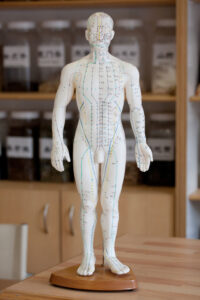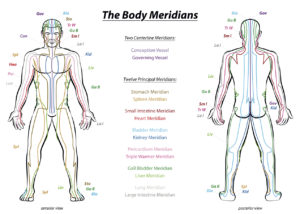MERIDIAN BREAKDOWN 101
What They Are And Why They Are Important

When some hear the term “meridian” mentioned in Eastern and Traditional Chinese Medicine (TCM), they start to zone out. Like most concepts not native to our own culture, some find it hard to grasp what meridians are and how that plays a role in health and wellbeing.
Here’s the 101 meridian breakdown to (hopefully) answer all your questions and demystify meridians once and for all.
What Are Meridians Exactly?
Put plainly, meridians — a.k.a. the meridian system — is a network of pathways that run along your body. Each meridian line (or pathway) channels and transports energy that Eastern medicine refers to as qi, but your meridians are also responsible for circulating your blood and fluids, too.
 As vessels that both channel and carry your energy, meridians are considered a vital part of your overall health. Whenever you experience unordinary symptoms or sudden changes in your health, it’s often an imbalance in your qi, or what experts like to call “qi stagnation.”
As vessels that both channel and carry your energy, meridians are considered a vital part of your overall health. Whenever you experience unordinary symptoms or sudden changes in your health, it’s often an imbalance in your qi, or what experts like to call “qi stagnation.”
But Wait, What Is Qi Stagnation?
Qi stagnation is when your qi stops flowing the way it should. Basically, it gets blocked, and the culprit is usually a greater underlying issue, like anxiety, stress, or something more tangible, like your diet or level of physical activity.
To free up your qi, you can see an acupuncture specialist or talk to a TCM specialist, who will analyze your symptoms and make recommendations for treatment. In general though, rejuvenating your qi often requires a change in your lifestyle, like a diet change or fitting more exercise and outdoor time into your day.
These small lifestyle changes bring balance back into your life and can make a significant, positive impact on your mood and overall well-being.
How Meridians Channel and Disperse Energy
So you know what meridians are. But how do they work exactly? Every meridian line in the body corresponds to a specific set of organs.
When you eat, your body breaks the nutrients down and your meridians disperse that energy to the right set of organs. There are 12 pairs of major meridians that you should be aware of:
 Meridians on your arms:
Meridians on your arms:
- Lung meridian
- Pericardium meridian
- Heart meridian
- Large intestine meridian
- Triple burner meridian
- Small intestine meridian
Meridians on your legs:
- Stomach meridian
- Gallbladder meridian
- Bladder meridian
- Spleen meridian
- Liver meridian
- Kidney meridian
Think of these 12 main meridians as highways that extend all across your body. When you drive on a highway, you pass smaller roads that split off and connect you to other major highways.
These smaller roads are also meridian channels that overlap and connect with your main meridians. They have a lot of names, like “divergent channels” and “extraordinary vessels” and “sinew channels”.
The list goes on and, while you can really dive deep into the complexities of meridians and their names, what’s important to know is that they generally have two key functions:
- They either act as energy reservoirs that contain your qi
- Or they circulate your qi to keep your organs functioning
There are roughly 72 meridians in total, and when they’re in good working order, they keep your energy flowing through your body and keep you healthy.
Want to know more? Here’s a more exhaustive explanation to go deeper into learning about how meridians work…
Got any other questions about meridians? Let us know in the comments!
Comments (0)
Leave a reply
You must be logged in to post a comment.




